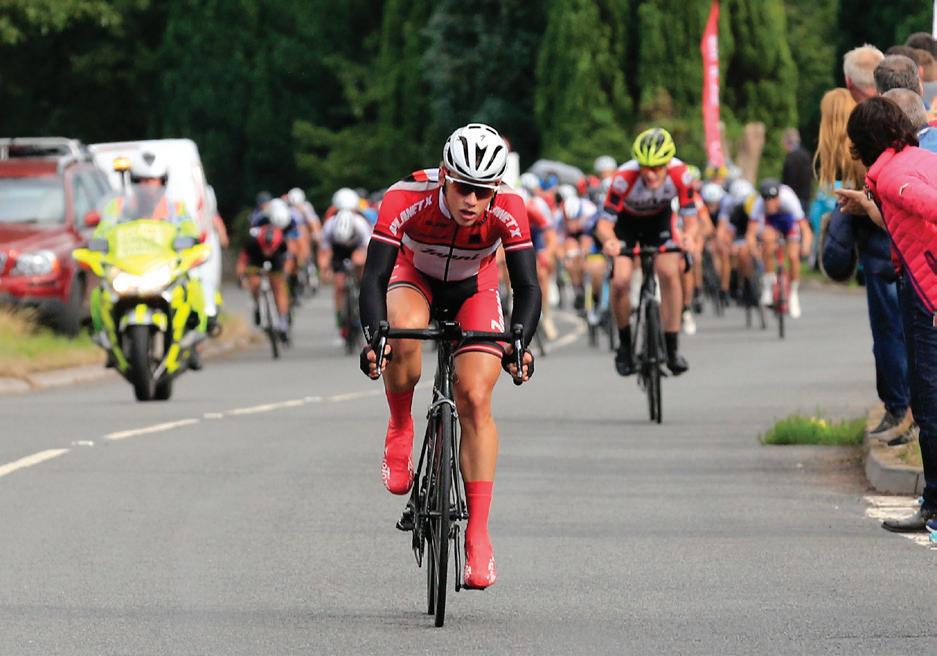
10 minute read
Charting a course through stormy waters, Mark Semmence
Charting a course through stormy waters Mark Semmence describes a West Country transformation
Barnaby Lenon, speaking at the recent HMC Conference in Stratford, is but the latest high-profile educationalist to express misgivings about the future of the independent sector; and anxieties regarding affordability and the place of independent education in a rapidly changing social and political context have swirled around the sector for some time. Lenon’s message, however, was clear: with independent education further and further beyond the reach of its traditional domestic market, schools which fall outside the magic circle of the M25 must adapt fast if they are to survive. The identification of, and investment in, a clear USP; a forensic focus on the quality of teaching and learning; the maximisation of a broad range of income streams and a market-oriented approach hold the key to success in challenging times.
The experience of Mount Kelly since its formation in 2014 is a case in point. All three antecedent schools – Kelly College, Kelly Prep, and Mount House Prep – had experienced significant decline in recent years and faced a highly uncertain future. However, over the last two years, Mount Kelly has seen a 30% increase in pupil numbers from Years 9 – 13, a new
‘Learning outside the classroom’: On this occasion, at Dartmoor
50m Olympic pool recently opened, and boarding houses now full to capacity, so the school’s recent history may offer some indications of how independent schools might survive the storm that is already upon us.
The first step for Mount Kelly was to drive through and firmly embed the merger, though, given the very distinctive ethos and market-orientation of the three constituent schools, this was always going to present challenges. Pupils, staff and parents had clearly to understand the imperative behind the merger, and this required an unsentimental analysis of the economic reality facing the three former schools. It was also critical, if the sceptical were to be brought on-side, that the merger should be seen to yield immediate benefits: in a competitive market, there is simply no place for promises of “jam tomorrow”.
Central to making the merger more than simply a legal reality was the clear understanding that every decision must be informed by a resolute commitment to the single school principle, and in matters of uniform, structure, curriculum, policy and process, the focus has been on the creation of
Well-structured with clear objectives

Cambridge IGCSE ® is the world’s most popular international education programme for 14 to 16-year-olds. With a wide range of subjects to choose from, schools can offer them in any combination to create the right programme for each student, and allow them to excel in their areas of strength.
Cambridge IGCSE acts as a rigorous preparation for students progressing to Cambridge International AS & A Level or Cambridge Pre-U and beyond.
Contact your local Cambridge representative on UKSchoolsDevelopment@cie.org.uk
The College at Mount Kelly

a single community. From whole-School church services, sporting events and social gatherings, to the establishment of a single parents’ association and the creation of a single School calendar, the one-school message must be clearly and consistently championed. Nostalgia, sentimentality or sacred cows – all of these are an impediment to the sort of change that has to happen quickly if a merger is to succeed.
Central also to this success has been a strategic re-direction towards boarding and, given the demographics of the School’s location on the sparsely-populated western edge of Dartmoor, it was critical to connect with the wider UK boarding market. The construction of the Olympic Legacy 50m pool has been central to this. Established in 1978, the Performance Swimming Programme at Mount Kelly has produced 72 international swimmers, 17 Olympians and 6 Paralympians. Swimming was therefore immediately apparent as the USP which would extend the School’s appeal both nationally and internationally, and has been the focus of major investment. Allied to further development of an already well-established swim programme, Mount Kelly is now attracting elite swimmers from across the UK, and for the parents of ambitious swimmers, this makes for an attractive offer: a 50m pool within walking distance of the boarding houses, a clear and growing commitment to the quality of teaching and learning, a high standard of boarding provision, and all located on the edge of the Dartmoor National Park.
Extending the day by two hours, enhancing the extracurricular programme, reinvigorating the weekend offer, and heightening the expectations on staff to contribute fully to the life of a busy boarding school, have also brought fundamental change to the ethos of the School. For a small number of parents this has not been easy, but the overwhelming majority of parents appreciate not only that their children are being offered a great deal more out of the classroom, and are being properly stretched and challenged in all areas, but that they are getting more for their money. Staff recruitment has also been central to ensuring the success of these changes, and the last eighteen months have seen the recruitment of a large number of new staff, all of whom bring to Mount Kelly a range of skills and talents, and most of whom have a strong boarding pedigree. At the same time, the School has committed to an extensive programme of refurbishment of boarding facilities, reinforcing a clear commitment to boarding.
The merger was also the moment to focus on the quality of teaching and learning across the School, and the re-shaping of the School went hand in hand with a root and branch overhaul of the curriculum, and of staffing and management structures. In a small school it made little sense to retain the traditional Head of Department role, so instead subjects have been clustered into faculty areas led by Heads of Faculty. Central to the Head of Faculty role is responsibility for the improvement of teaching and learning and, to that end, the tracking, recording and reporting systems have also been overhauled and improved. Allied to this has been the introduction, in consultation with teaching unions, of an annual, evidence-based appraisal system which, focused on a slightly modified version of the national teaching standards, encourages dialogue and collegiality amongst the staff and between staff and senior leadership.
The merger also provided the opportunity for structural change and has enabled the new School to offer the sort of flexibility on which success in an increasingly fragmented market depends. Kelly College had for many years been a Years 7 to 13 School, drawing pupils mainly from Kelly College Prep School which finished at Year 6. Mount House, across the valley of the river Tavy and always entirely independent from Kelly College, was a more traditional prep school, running up to Year 8 and preparing children for Common Entrance and progression to senior schools around the country. A critical question on merger, therefore, and one that was central to determining the shape of the School, was where the provision
for Years 7 & 8 would be sited, and what curriculum would be followed.
The decision to retain a traditional Prep/Senior School model, the College starting at Year 9 and with Years 7 & 8 located at the Prep studying the Common Entrance syllabus, was based on solid educational and pastoral principals. For many pupils in 11+ senior schools, Years 7 & 8 can be a time of drift. A clear commitment to the Common Entrance syllabus for all pupils, and the prospect of externally-set exams at the end of Year 8, however, bring greater educational focus and impetus. The decision to make provision for Years 7 & 8 at the Prep, rather than the College, also has clear pastoral benefits. Pupils have another two years in which to grow, mature and develop, before facing the challenges of life in a senior school, and are also able to take on positions of responsibility and leadership which would be denied them in a senior school setting.
Boarding in Years 7 & 8 also plays an important role in Mount Kelly’s appeal to parents who may wish to move their children from distant rural primary schools into the independent sector at Year 7. In a large and sparsely populated region, the School’s location enables parents across Devon and Cornwall to engage with the life of the School without the challenge of a long school run every morning and evening, while a busy programme of competitive fixtures on Saturday mornings means that parents are able to attend matches and still have their children home for the weekend. Investment in facilities and the improvement of standards at the College make remaining within the Foundation an increasingly attractive option. The commitment to Common Entrance at Years 7 & 8, however, also enables those who wish to continue their education up-country to do so, and the School has a trackrecord of pupils progressing to high-profile schools, many with
&THERE HERE
scholarships. This structure therefore facilitates entry into and exit from the School at a range of points.
In common with many other UK independent schools, Mount Kelly has also been pursuing opportunities overseas, and an international school in Hong Kong has been announced (subject to licence approval), while other areas for expansion are also under consideration. Such flexibility is vital if schools are to maximise other alternative income streams and, like all schools, Mount Kelly has been active in this area. Location and facilities are clearly central to initiatives in this area, and the School’s 150 acre site, located on the edge of Dartmoor National Park, with its own stand-alone adventure centre, and highquality boarding accommodation within a stone’s throw of the 50m pool, offers a range of commercial opportunity. Success in this area, however, hangs on having the right people in place, and the appointment of an experienced Commercial Director, with a remit to create and develop a greater range of revenue streams, has been critical to the commercial progress of the Foundation.
These are uniquely challenging times for the independent sector, and the hard reality is that, outside the south east, the days of the small, all-round, rural independent school are now numbered. Mount Kelly’s early history suggests, however, that for schools that can adapt quickly, are able to offer flexibility in a changing market, are willing to invest in a USP, and can proactively seek the benefits of local merger, the future remains bright. Mark Semmence worked in the international sports marketing sector before teaching at Rugby School where he was Assistant Head Master. He became Head Master and Principal of the Foundation at Mount Kelly in 2014.
Abingdon School Sixth Former signed by Leopard Pro Cycling for 2017

Abingdon School sixth former Charlie Quarterman has been signed by the well-known Luxembourg-based team Leopard Pro Cycling for 2017. The team has a great reputation for developing U23 riders that go on to World Tour level. Speaking about his success Charlie, aged 18, said, “I am very excited about joining Leopard Pro Cycling. It’s a team with a great reputation and a diverse calendar that will test me in a whole range of racing environments. There is a very good support team and a good atmosphere with the mix of older and younger riders. I’m really looking forward to being in a solid team. In 2017 I want to learn how to ride in the U23 races, but I also will try to finish with a podium place.” Charlie only started cycling four years ago, having been inspired by the road race of the 2012 Olympic Games in London. Since then he has progressed rapidly with Oxford’s Zappi Racing Team, resulting in a promising 2016 season with a third place in the Giro di Basilicata, and strong placings in two of Belgium’s top Junior races: Omloop der Vlaamse Gewesten (5th) and the Grand Prix Bati-Metallo (6th). Pictured: Junior Tour of Wales, Stage 4. August 2016. Charlie breaking away from the peloton to take 4th place.










